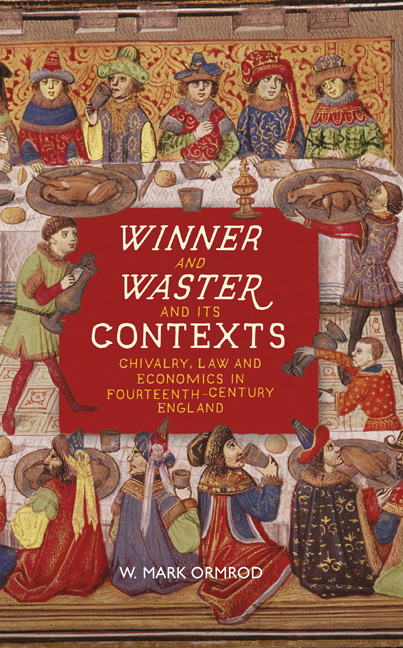Book contents
- Frontmatter
- Contents
- Acknowledgements
- Note on Editions
- List of Abbreviations
- Introduction: Winner and Waster: A Poem on the Times
- 1 Chivalry and Internationalism: The Garter Feast of 1358 and English Diplomacy during the 1350s and 1360s
- 2 Treason, Public Order and Dispute Settlement: The Statute of Treasons of 1352 and Royal Arbitration
- 3 Landed Society, Conspicuous Consumption and the Political Economy: The Sumptuary Laws of 1363
- 4 The Private and the Public Spheres: The Royal Household and State Finance under Edward III
- 5 Satire, Complaint and Authorship: Winner and Waster and the Alliterative Revival of the Fourteenth Century
- 6 Winner and Waster: Timeliness and Timelessness
- Appendix 1 Timeline, 1337–70
- Appendix 2 A Modern English Version of Winner and Waster
- Bibliography
- Index
- Publisher̕s Note
1 - Chivalry and Internationalism: The Garter Feast of 1358 and English Diplomacy during the 1350s and 1360s
Published online by Cambridge University Press: 09 April 2021
- Frontmatter
- Contents
- Acknowledgements
- Note on Editions
- List of Abbreviations
- Introduction: Winner and Waster: A Poem on the Times
- 1 Chivalry and Internationalism: The Garter Feast of 1358 and English Diplomacy during the 1350s and 1360s
- 2 Treason, Public Order and Dispute Settlement: The Statute of Treasons of 1352 and Royal Arbitration
- 3 Landed Society, Conspicuous Consumption and the Political Economy: The Sumptuary Laws of 1363
- 4 The Private and the Public Spheres: The Royal Household and State Finance under Edward III
- 5 Satire, Complaint and Authorship: Winner and Waster and the Alliterative Revival of the Fourteenth Century
- 6 Winner and Waster: Timeliness and Timelessness
- Appendix 1 Timeline, 1337–70
- Appendix 2 A Modern English Version of Winner and Waster
- Bibliography
- Index
- Publisher̕s Note
Summary
Although W&W is often represented in the critical literature as a debate between the chivalric and the mercantile elements in fourteenth-century society, it is the contention of the present study that the poem is much more preoccupied with the activities, values and attitudes of the landed classes in general, and particularly that large portion of the lay elite that participated actively in the early stages of the Hundred Years War. This chapter argues that W&W references the special tournaments and feast of the Order of the Garter organised by Edward III in 1358, as well as the diplomatic manoeuvres that went on during the later 1350s and the first half of the 1360s around the attempts (many of them sponsored by the papacy) to promote an agenda of lasting peace between England and France. In so doing, we take the terminus ante quem for the composition of the poem into the mid-1360s where, as Chapter 3 argues, we can also best locate the opinions about the political economy that dominate the formal debate between Wynnere and Wastoure. This chapter focuses more on the opening and concluding sections of the poem which, it argues, provide clear evidence of the poet's detailed knowledge not only about the form and nature of the activities of the Order of the Gar¬ter but also about the contemporary controversies, articulated in parliament, about unwelcome papal influence in the kingdom.
An important starting point is the inferred location in which the events of the poem unfold. Previous critics of W&W have commented extensively on its description of the setting in which the debate between Wynnere and Wastoure is called forth and takes place. Yet this location has almost always been seen solely as representing a type – the outdoor theatre or the tourna¬ment arena – rather than a specific, ‘real’ place. The poet finds himself, in his dream, in ‘a loveliche lande that was ylike grene,/ That laye loken by a lawe the lengthe of a myle’ (‘a lovely laund of an even green/That lay encir¬cled by earthworks extending a mile’) (lines 48–9), and from there espies armed men gathered ‘In aythere holte’ (‘In either grove’) (line 50) at the sides of the laund.
- Type
- Chapter
- Information
- Winner and Waster and its ContextsChivalry, Law and Economics in Fourteenth-Century England, pp. 15 - 38Publisher: Boydell & BrewerPrint publication year: 2021



